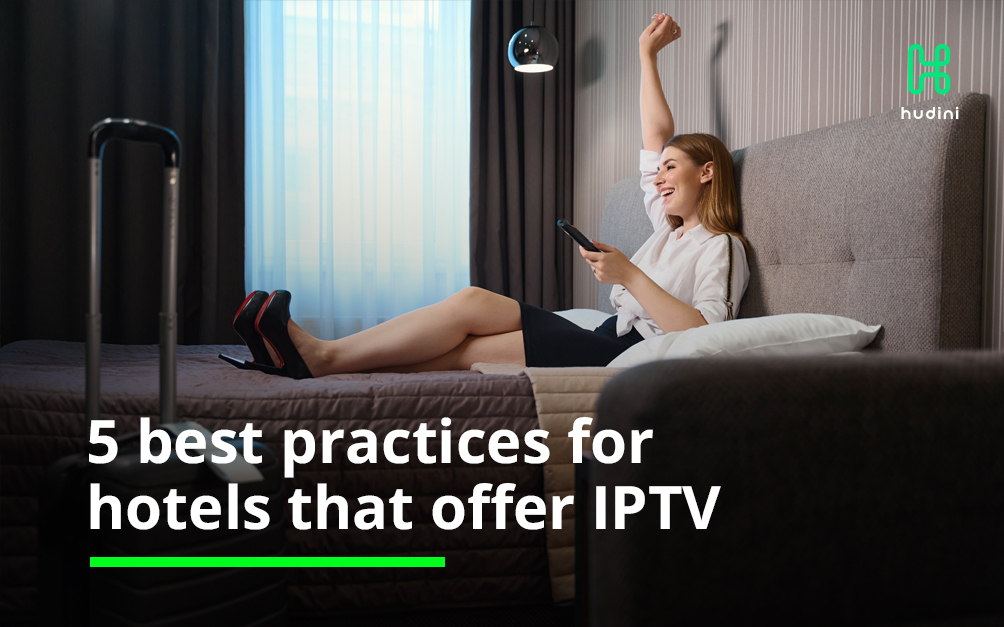
5 best practices for hotels that offer IPTV
- Hudini
No matter how far they’ve traveled, guests like to feel completely at home in their hotel room. Hotels can make small yet thoughtful changes to accomplish this, and the IPTV is the perfect medium with which to spearhead the effort. While the traditional TV is a one-way medium that’s meant only for entertainment, Internet Protocol Television (IPTV) is a versatile and interactive platform that can inform, entertain and personalize. However, there are several measures that hotels can take to optimize IPTV’s benefits for their guests, staff and themselves.
1.Make the IPTV user-friendly
For guests, finding the channel they’re looking for in the language of their choice is an exercise in trial and error. Hotels can avoid this by making channel navigation intuitive and effortless.
This can be accomplished by including a preset TV guide with popular local and international channels that are sorted by genre. The icons on the remote control should be self-explanatory and universally understood, and the channel menu can be multilingual so that international guests can also access content easily. The inclusion of accessibility features such as subtitles, audio tracks, closed captioning and voice command capabilities will go a long way in making the in-room TV more engaging and useful.
2. Link it to the hotel app
Guest experience apps, such as those designed by Hudini, connect every step of the guest journey on a digital platform that guests can access through several online channels. IPTV is one of them. Guests can log into their unique profile on the IPTV and order room service, adjust the room’s temperature and lighting, schedule housekeeping, sync their personal OTT accounts, seek real-time assistance from the chatbot and preview their bills before check-out.
The IPTV serves as an all-in-one touchpoint for both entertainment and guest engagement. If the guest is watching a movie and would like to order room service, she can do so without having to use multiple devices.
3. Enable personalization & upselling
IPTV can make stays more bespoke on several fronts. Guests can be greeted with a personalized welcome message as soon as they enter the room. Travelers often share preferences or make special requests while booking, and this data can be used to customize F&B options, guest itineraries and entertainment suggestions.
Guests can also stream content from their mobile devices and OTT accounts on the IPTV, instead of watching regular programming from the TV menu. When IPTV is an interface for the guest app, it can also prompt guests with add-ons and upgrades that are specific to their preferences. Think sugar-free desserts for a guest who orders a keto meal or a cake and floral bouquet for a couple who are celebrating their anniversary.
4. Ensure data protection
Since the IPTV has multiple uses, it also generates several streams of data. For example, a guest might log into his personal Netflix account on the IPTV, but forget to log out before departure. The hotel must have protocols in place to ensure that neither the staff nor subsequent guests have access to his account or viewing preferences.
If the guest accesses the hotel app via the IPTV, these interactions also yield data that has to be protected. Hotels can do this through regular security updates and audits, staff training, compliance with data protection regulations, data encryption and securing wifi networks.
5. Provide useful information
The in-room TV always catches the guest’s eye, and it can be used as a digital signboard by hotels. Let’s say you run a luxury safari lodge. Safari timings are sacrosanct and guests have to be politely reminded that they should report for the safari 15 minutes prior to the starting time. Highlighting the timings while wildlife photographs play on the TV will deftly serve this purpose, while also saving guests the trouble of calling the front desk for this information.
Hotels can also provide real-time updates on the weather and news; the local sights and special events at the hotel can also be showcased, helping guests plan their stays better. Curated recommendations that align with the guest’s tastes, such as a dimsum festival at your restaurant, can also help bolster ancillary revenue.
The IPTV has become a necessity for tech-savvy guests. A recent study reported that 45% of guests listed on-demand entertainment access that seamlessly connects to their personal streaming or gaming accounts as the #1 must-have during their stay.* A guest might switch on the IPTV looking for entertainment, but hotels can capitalize on this moment to offer so much more and enrich their stay. These interactions and personalization opportunities can also improve revenues, proving equally rewarding for hotels as well.
*According to a study conducted by Skift and Oracle.
Engage, Elevate.

Join our mailing list
Enter your email address


